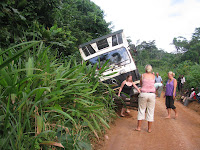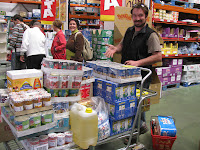But stories abound. For the moment, here are 10 more observations.
1. Rock hyraxes sound like terradactyles -- at least what they ought to sound like.
2. Lions are extremely lazy. You could probably have one as a pet as long as they get fed regularly.
3. Whitewater rafting is fantastic -- so is skydiving. Do both when you have the chance.
4. The Ethiopian calendar is seven or eight years behind. They celebrated their millenium not long ago.
5. The Ethiopian clock is out too -- it's six hours behind so the internet cafe I'm sitting in opened at 3 a.m. today.
6. The side of a taxi van may say it is limited to 14 passengers, but that's a fib. How about 21! And that doesn't count two enormous sacks of potatoes.
7. The most interesting restaurant in Africa is near Mount Kenya. It's called Trout Tree and is in a treehouse. The food is sensational.
8. On the topic of food, Haandi's Restaurant on the main street in Kampala, Uganda serves the best Indian food I have ever eaten. The Goan fish dish is a must.
9. Leaf springs can break. We managed to ruin the two on our truck in two days.
10. Baboons are thuggish.










